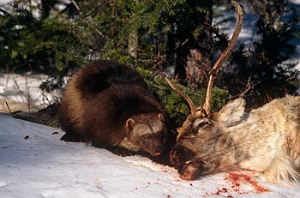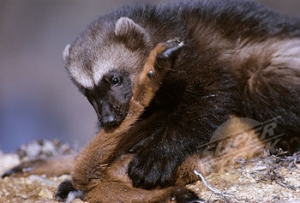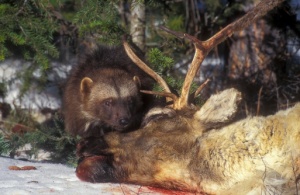(A longer discussion of animal greed can be found in my book.)
What is greed?
Greed is often defined as the intense and selfish desire for something, especially wealth, power, or food. Although we usually associate this unseemly characteristic to humans, it is readily apparent that animals can also be greedy. Many animals are gluttonous, territorial, and many don’t seem at all interested in sharing. The reason is also obvious: the more you have, the better you’ll do when it comes to surviving and reproducing.
Greed, however, often takes things further than just acquiring resources for one’s self. It’s also relative wealth. Humans don’t measure their own wealth in absolute terms, but rather in how their wealth stacks up to their neighbors. Why would this be? If the only matter at hand is one’s own health and reproduction, who cares what others do or have? Why would evolution have trained us to measure our wealth only in comparison to that of others?
Competition. Reproduction is always competitive, even in the best of times. No matter how many mates are freely available, some are more desirable than others. No matter how many offspring you can have, those offspring will have to vie for their place against other’s offspring.
Many animals, especially mammals, especially primates, and especially humans have evolved cooperative social structures and behaviors to augment the ruthless intraspecies competition seen in many other kinds of animals. But this does not mean that cooperation has totally replaced competition. Is is in our nature, as humans and as primates, to be bother cooperative and competitive, depending on the conditions at the moment and the identity of the friend or foe in question.
For example, we are more likely to cooperate with kin than non-kin. In times of external threat, relatives will help each other and even fight and die for each other. However, within a family, there is plenty of competition as well. Sibling rivalry, anyone?
What is the benefit of greed?
To answer this, let’s talk about the wolverine. This aggressive and powerful member of the weasel family has a reputation for being quite the bully. Wolverines can successfully fight off and chase away much larger animals including bears, cougars, and moose (!). There are even stories of a lone wolverine fending off an entire pack of wolves, each one of which probably outweighing the wolverine.
They also have a penchant for being smelly. Sometimes called the skunk bear, wolverines frequently spray their territory, their food, their mates, their offspring, and even themselves with a mist from their anal glands. Given their toughness, other animals are well advised to steer clear of the musky scent of the wolverine.
Not surprisingly, wolverines are expert hunters, rarely preyed upon, and comfortably at the top of their food web. Because their food sources are all in common with many other predators, they have become fierce competitors. Wolverines are known to chase other scavengers away from a carcass and they have no shame in stealing a hard earned kill from a smaller wolverine or even a different animal entirely.
They are voracious eaters, which gave rise to their various names in other languages such as “glutton” (in French), “gluttonous badger” (in Romanian), and “fat belly” (in Finnish). In fact, the scientific name of the wolverine is Gulo gulo, from the Latin word for gluttony.
Although wolverines sound rather like playground bullies, this is all pretty standard food competition. Where does the greed come in? Well, after a wolverine has eaten all it can whether from its own kill or find, or something it has stolen from some unfortunate shlimazl, it will actually spray the leftover food with its marking scent.
This might not seem so weird and biologists once thought that the wolverines were simply marking the food to protect its next meal of leftovers. However, this doesn’t seem to be the case. The wolverines rarely return to their leftovers. Sure, the distinctive wolverine scent alone is probably enough to dissuade many animals, but it turns out that the spray of wolverines, unlike that of skunks, is highly acidic. By spraying noxious carboxylic acids onto the leftover food, the wolverines actually accelerate the spoiling process.
To summarize, the wolverines have consumed all they can fit into their stomachs, and then they try to spoil any leftovers so that other predators and scavengers can’t eat them. This fits part of our description of greed. It’s not just about acquiring things; it’s about having more than others have.
But are wolverines really “greedy?”
Those not comfortable assigning the term “greed” to these small weasels may counter that this is just a good competitive strategy. If an animal is in constant competition with other animals for the same food sources, there is an advantage in not feeding your competition. By leaving leftovers behind, the wolverines would be helping future competitors stay alive and live to fight another day.
My response to that is, “bingo!” Greed is precisely that! It is an intense competitive strategy that goes beyond just getting what you need. Greed is about seeing everything else as competition and measuring what you have against that of others.
These wolverines meet human definitions of greed because they take extra measures to harm the standing of competitors, or at least prevent them from being able to improve their own standing. No matter how much food may abound at that moment, wolverines consider every meal a zero-sum game. Out in the wild, there is no trophy for just participating and no silver medal for coming in second.
Wolverines know that wealth is relative, social standing is relative, and even access to food is relative. It’s great to be well-fed. It’s even better to be well-fed while others are starving.
When you think about it, is human greed really any different from that of wolverines?
-NHL (@nathanlents)




What is a she mail? Some other kind of carnivore7?
LikeLike
I meant shemazl
LikeLike
Shlimazl is Yiddish, it means the unfortunate recipient of bad luck. (I had spelled it incorrectly.)
LikeLike